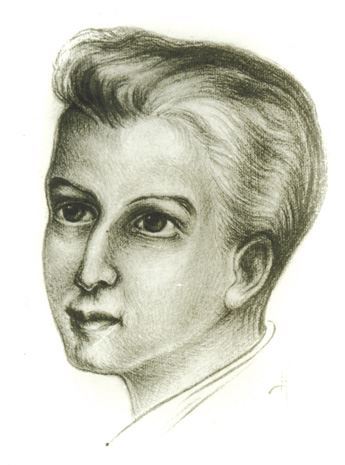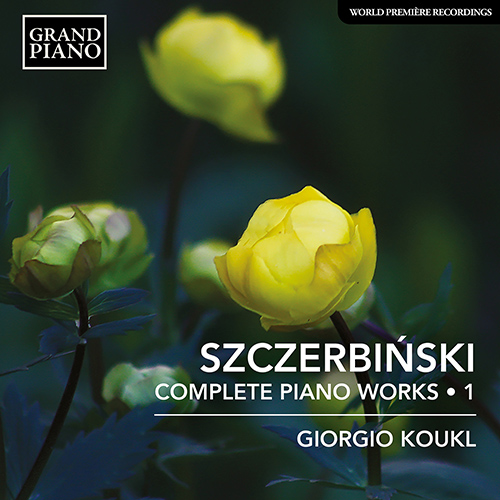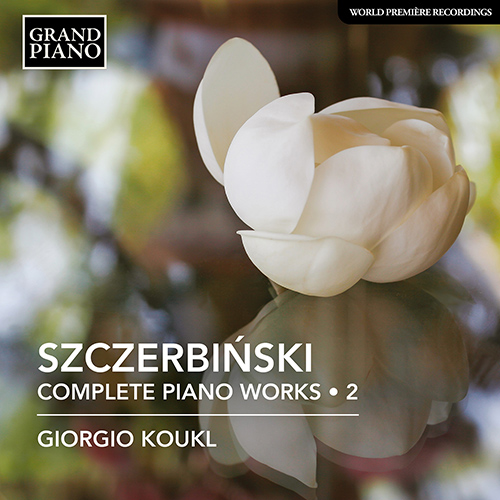
Alfons Szczerbiński (1858 - 1895)
Alfons Szczerbiński was born on 2 April 1858 to Franciszek, a senior court clerk, and Julia née Kostrzewska. His teenage years were spent in the slightly larger town of Śrem (known in German as Schrimm) not far away, where he matriculated at the Gymnasium in 1870. Alfons Szczerbiński’s first music instructor was most probably an organist by the name of Kraszkiewicz. The boy remained under his tutelage only for half a year, but he was already demonstrating creative talents; in fact, Szczerbiński was already jotting down musical ideas at the ripe old age of 7, when he composed Phantasy.
Szczerbiński had the good fortune to come of age in a family which loved music, and in an environment where intellectual pursuits were encouraged. As a pupil of the Śrem Gymnasium, he took an active part in the musical life of the city, appearing as an organist and playing in school concerts. Yet his artistic talents were not matched by physical stamina, and his parents – concerned at his persistently weak health – forbade Szczerbiński from continuing his education further afield than Śrem.
Only once his father passed away in 1877, and once he graduated from the Gymnasium, did Alfons Szczerbiński manage to head out to Berlin. Alas, he cut short his studies at the conservatory after only two years on account of financial problems. This disappointment was soon relegated to the past, however; in 1880, at only 22, he successfully sat his entrance auditions to the Royal Academy of Fine Arts, playing his own pieces before a high commission headed by director Joachim himself. The professors were sufficiently impressed, also by his renditions of Johann Sebastian Bach’s Fugues from Das Wohltemperierte Klavier in a variety of keys, that they admitted him to the Academy with a scholarship of double the usual amount and a benediction to the effect that, someday, he might become the new Beethoven. Szczerbiński duly continued to train as a composer under the tutelage of Edward Grell and Waldemar Bargiel, recognised teachers of the time, and completed his degree course in 1883.
Upon returning to Poland, Szczerbiński joined the household of Count Plater in Niekłań by Radom, working as a music teacher. Far from neglecting his compositional work, he turned out a steady succession of sonatas, chamber pieces, and compositions for vocals and piano. He regularly travelled west to visit his family, now settled in Śrem.
In 1893, Szczerbiński relocated to Kraków with plans to teach music to children of the aristocratic houses. This proceeded well enough, and he did not seem to complain about lack of work, but his ambitions as a composer and pianist remained unsatisfied. With time, Szczerbiński seems to have grown discouraged – his application for a teaching position at the Kraków Conservatory was rejected, and he was suffering money troubles again – and he began contemplating a withdrawal from worldly matters into religion. Father Łubieński, a Redemptorist, was doing his best to encourage the musician along this spiritual route. The two had an appointment to meet in Stary Sącz for another serious talk during which the friar would presumably renew his exhortations that Szczerbiński take his vows. But this was not to be – Szczerbiński suffered fume inhalation from a defective heating installation at his Stary Sącz lodgings and, rather than at Father Łubieński’s monastery, ended up at his sister’s home back in Śrem, more dead than alive. His health went from bad to worse, and he died on 25 March 1895.
The known oeuvre of Alfons Szczerbiński largely consists of works for piano. Even this relatively modest sampling, however, identifies Szczerbiński as a prominent Polish talent in the Romantic mould who took it upon himself to compose music for poems by Adam Asnyk, Michał Bałucki, or Friedrich von Matthisson (some of the latter’s poems were also set to music by Ludwig van Beethoven and by Franz Schubert).
Wojciech Czemplik
Translated from Polish by Bartek Świetlik



 Grand Piano has gained a reputation for producing high quality recordings of rare keyboard gems. Dedicated to the exploration of undiscovered piano repertoire, the label specialises in complete cycles of piano works by many lesser-known composers, whose output might otherwise have remained unknown and unrecorded.
Grand Piano has gained a reputation for producing high quality recordings of rare keyboard gems. Dedicated to the exploration of undiscovered piano repertoire, the label specialises in complete cycles of piano works by many lesser-known composers, whose output might otherwise have remained unknown and unrecorded.






